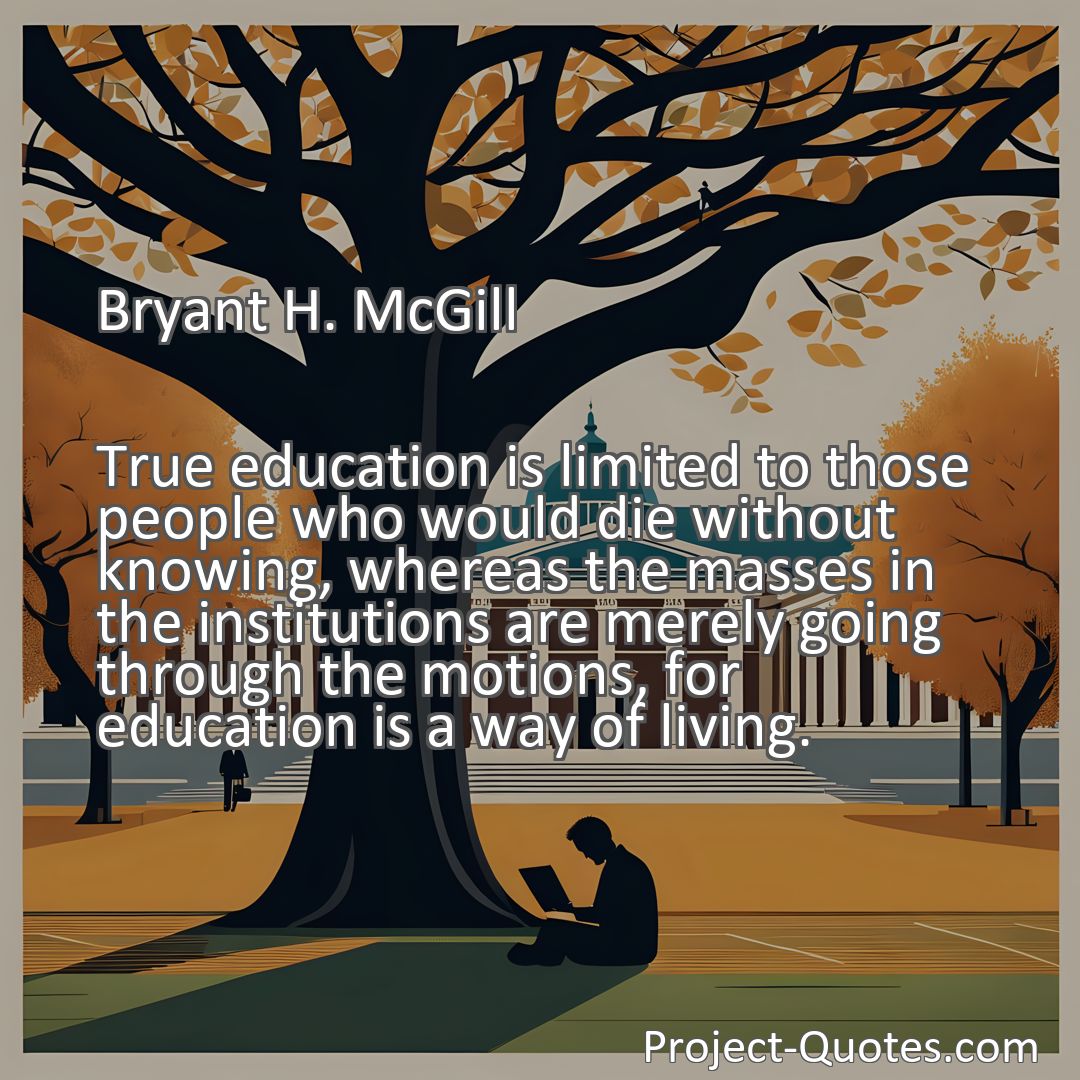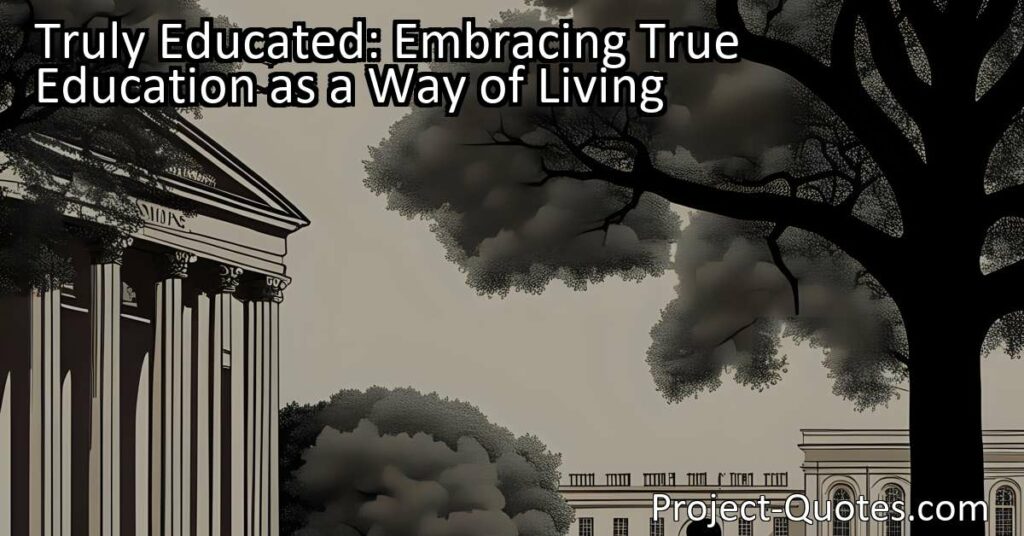True education is limited to those people who would die without knowing, whereas the masses in the institutions are merely going through the motions, for education is a way of living.
Bryant H. McGill
Education is more than just attending school and memorizing facts. Being truly educated means going beyond surface-level learning and actively engaging with the material, critically thinking, and seeking a deeper understanding. It involves developing analytical skills, problem-solving abilities, and a growth mindset to foster adaptability and resilience. By embracing this approach, individuals can unlock the transformative power of knowledge and experience lifelong growth.
Table of Contents
- 1 True education is limited to those people who would die without knowing, whereas the masses in the institutions are merely going through the motions, for education is a way of living.
- 2 Bryant H. McGill
- 3 Meaning of Quote – True education is limited to those people who would die without knowing, whereas the masses in the institutions are merely going through the motions, for education is a way of living.
- 4 Freely Shareable Quote Image
- 5 Related
Meaning of Quote – True education is limited to those people who would die without knowing, whereas the masses in the institutions are merely going through the motions, for education is a way of living.
Embracing True Education: A Way of Living
Introduction :
Education is often seen as a means to an end, a pathway to success, career opportunities, and personal growth. However, according to Bryant H. McGill, true education goes beyond the walls of institutions and encompasses a way of living. In this piece, we will delve into the underlying meaning of this quote, exploring the idea that genuine education stems from a thirst for knowledge, a burning desire to understand the world around us, and a willingness to embrace lifelong learning. Let us embark on a journey to discover the transformative power of true education.
Understanding the Essence of True Education :
To truly grasp the concept of true education, we must first understand that it extends far beyond textbooks and classroom lectures. It is not confined solely to a specific time and place but instead seeps into all aspects of our lives. True education arises from the desire to learn simply because knowledge is inherently valuable and enriching. It emerges from within, driven by curiosity, and the recognition that there is always more to be discovered. It is a lifelong process that nurtures the mind, shapes character, and broadens perspectives.
While many individuals may pass through the motions of attending educational institutions, being truly educated means going beyond surface-level learning. It requires an active engagement with the material, critical thinking, and a thirst to understand the underlying concepts rather than merely memorizing facts. True education involves the development of analytical skills, problem-solving abilities, and the cultivation of a growth mindset that fosters adaptability and resilience.
Expanding the Educational Landscape :
McGill’s quote challenges the notion that education is bounded by institutions, emphasizing that true education encompasses all aspects of life. Education can be found not just in the confines of classrooms, but in the world around us. Nature, relationships, and personal experiences all offer opportunities for growth and enlightenment.
Nature, for instance, is a treasure trove of knowledge waiting to be explored. It teaches us about resilience, adaptability, and the interconnectedness of all living beings. By observing and interacting with the natural world, we can develop a deeper understanding of both its wonders and our place within it. Taking the time to appreciate the beauty of a sunset, the intricacy of a flower, or the power of a thunderstorm instills a sense of awe and sparks curiosity within us.
Similarly, friendships and relationships provide another avenue for learning. Interacting with others exposes us to diverse perspectives, experiences, and ideas. Through compassionate listening and meaningful conversations, we gain insights and broaden our horizons. These human connections are educational in themselves, teaching us about empathy, understanding, and the value of open-mindedness.
Living Education: Holistic Growth :
True education encompasses more than just the accumulation of academic knowledge. It molds individuals into well-rounded human beings, guiding them on a journey of self-discovery, personal growth, and character development. It fosters qualities such as resilience, compassion, and intellectual curiosity that extend far beyond classrooms.
Living education calls for an integrated approach that acknowledges the interconnectedness of various aspects of life. It encourages the development of physical, emotional, and spiritual well-being alongside intellectual growth. Engaging in physical exercise, artistic pursuits, and spiritual practices can all contribute to a well-rounded education. By nurturing these areas, individuals cultivate balance, inner strength, and a holistic understanding of themselves and the world.
Moreover, living education involves embracing creativity, critical thinking, and problem-solving. These skills empower individuals to navigate the complex challenges of life, adapt to change, and create positive change in their communities. Education as a way of living instills a love for learning and a commitment to personal growth that persists long after formal education has ended.
Conclusion :
As Bryant H. McGill astutely noted, true education is not confined to educational institutions but is rather a way of living. Embracing the idea that education extends beyond classrooms empowers individuals to embark on a lifelong journey of learning, self-discovery, and personal growth. It involves an open and curious mind, a willingness to explore the world around us, and a commitment to continuous improvement. By recognizing that true education encompasses all aspects of life, we unlock the transformative power of knowledge, enabling us to live purposefully and make a meaningful impact on the world.
I hope this quote inspired image brings you hope and peace. Share it with someone who needs it today!


